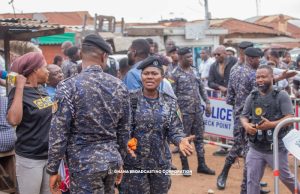Baptista is author of the new book ‘Prepare for the Future of Work’. Building an efficient & effective workforce team is her business. Affecting lives is her calling! She is a Hybrid Professional, HR Generalist, strategic planner, innovative, professional connector and a motivator. You can reach her via e-mail on [email protected] You can follow this conversation on our social media pages; @Sarahtistagh Facebook / LinkedIn/ Twitter / Instagram: FoReal HR Services. Call or WhatsApp: +233(0)262213313. Follow the hashtag #theFutureofWorkCapsules #FoWC
This is to wish you all a happy, healthy, progressive, promotional and prosperous New Year. Welcome to 2023! I congratulate all friends, partners and neighbours of the diaspora recently granted Ghanaian citizenship. This is an invitation for you to support making Ghana great and strong. To create the kind of society we want, we all must work to build it. As we celebrate the New Year, we need to envisage making Ghana resilient. Ghana must develop skills tailored to the fourth industrial revolution so that the Ghanaian workforce’s expertise expertise is aligned with 21st century markets, while facilitating adoption of digital innovations by the informal sector.
Measuring Ghana’s economic, social and institutional performance in light of the targets set by international standards and its economic indicators, it is worth noting digital transformation can create quality jobs and contribute to achieving the Ghana we want. The Ghanaian economy can become more resilient to the global recession triggered by the COVID-19 pandemic and many other factors. It’s the era of skills and not paper certificates; how are you preparing for the future of work and the challenges it presents?
Policy, strategies and action plans can support this drive. To begin with, the African Union’s Agenda 2063 talks about the Africa we want. We realise this blueprint and master plan document will support the transformation agenda for Africa, making it the global powerhouse of the future. The continent’s strategic framework aims at delivering on its goal for inclusive and sustainable development, serving as a concrete manifestation of the pan-African drive for unity, self-determination, freedom, progress and collective prosperity pursued under Pan-Africanism and African Renaissance. In the same way, Ghana needs policy, strategic and action plans directing concrete steps government, partners and stakeholders have to consider in supporting creation of the ideal Ghana we want. To this end, a policy directive on paper without proper implementation equates to mere advice – as “knowing and not doing is not knowing”.
Focusing then on the complete Ghana-isation of the body, soul and mind, the country needs to come to the realisation that we all need to re-focus our attention and energies on the most important things addressing issues of survival, prioritising things that will promote the mental health of all its citizenry, building economic resilience and trust among others. Powerful as focus is, it yields commitment and creates results. To this end, Ghana must work again.
The African Union’s Agenda 2063 genesis was the recognition by African leaders that there was a need to refocus and reprioritise Africa’s agenda from the struggle against apartheid and the attainment of political independence for the continent – which had been the focus of ‘The Organisation of African Unity’ (OAU), precursor of the African Union; and instead to prioritise inclusive social and economic development, continental and regional integration, democratic governance, peace and security among other issues aimed at repositioning Africa to become a dominant player in the global arena.
As an affirmation of their commitment to support Africa’s new path to attaining inclusive and sustainable economic growth and development, African heads of state and government signed the 50th Anniversary Solemn Declaration during the Golden Jubilee celebrations of the formation of the OAU/AU in May 2013. The declaration marked the rededication of Africa toward attaining the Pan African Vision of “an integrated, prosperous and peaceful Africa, driven by its own citizens, representing a dynamic force in the international arena”.
We need to now work toward the attainment of an integrated, prosperous and peaceful Ghana. This agenda must be driven by Ghanaians ahead of election 2024. How then can this agenda be supported by all when it appears believing in Ghana is a now crime? How do I know this? The hullabaloo surrounding the recent ‘secured’ government bond and its coupon payments in media reports leaves more to be desired. Are you also wondering if believing in Ghana is a crime? A number of economic predictions have been out already and many Ghanaians may be wondering if the year 2023 will be any different from the previous years.
Nevertheless, it’s a great time to continue to believe in Ghana and Africa. We need to project that positive energy now more than ever. Despite all odds, know the grass is still greener here. Only a few will understand and appreciate this. With news and updates on the recent government bonds, you may also be tempted to envision all is lost. Remember, this too shall pass. We have one Ghana as our banner; we need peace, unity and love to forge ahead into the unforeseeable future as we primarily work to protect lives of its citizenry.
Agenda 2063 is the concrete manifestation of how the continent intends to achieve this vision within a 50 year period – from 2013 to 2063. Hit by the COVID-19 pandemic, the global economy contracted by at least some 4.5% as put forward by the Africa Development Dynamics report. The African continent, highly exposed to external shocks, experienced its first recession in 25 years – with a decline in gross domestic product (GDP) of between 2.1% and 4.9% according to scenarios mapped out by the African Union since July 2020 in collaboration with the OECD Development Centre when external shock predictions were underway.
You do not want to know the recent trends. African governments earlier responded to this massive shock with lockdowns, social protection, and economic support with recovery measures. With the onset of the new Covid XBB.1.5 sub-variant let’s prioritise our health as a nation and remember to introduce and sustain the natural pharmacy in our homes best situated in our kitchen. Our health in moments like this becomes our wealth. Let’s live our good health well.
To support making Ghana resilient, the country must focus on digital transformation strategies and take a new look holistically at education in general to create quality jobs and contribute to achieving Agenda 2063. When the financial sector clean-up began in Ghana, a number of jobs were lost. Research predicts global job losses between now and 2030 when new jobs will be created as a result of quick adjustments introduced into the world of work. Amazon recently announced a more than 18,000 job cut in its latest tech worker purge. Salesforce also announced a 10% cut of its workforce. By January 5, 2023, media reports had it that tech layoffs in January exceeded those of December’s figures – just 5 days into the new year.
Ghana must develop skills tailored to the fourth industrial revolution so that the Ghanaian workforce’s expertise is aligned with 21st century markets, while facilitating the informal sector’s adoption of digital innovations. On the other hand, it must not be business as usual for our institutions of learning. The quick adjustments introduced to the world of work must be considered and factored. BBC News and other media reports have it that nearly a third of most university courses still have hybrid-teaching embedded. The changes may be at a slow pace, but will happen per research. Our Ghanaian youth need sustainable incomes, training and support to acquire relevant business skills needed in building the Ghanaian economy.
Eight years down the line, Africa’s Development Dynamics in its collaborative approach supports with insights on how the continent can be made more resilient. This collaboration resulted from a solid and broad partnership between the African Union’s Commission for Economic Affairs and the OECD Development Centre. A team of academic researchers, economists, statisticians and other experts from Africa and diverse world regions contributed to its recent report, which put forward some policy recommendations to each region as defined by the Abuja Treaty: looking at Africa in block groupings as in Southern, Central, East, North and West Africa.
For Ghana to be more innovative, inclusive and attain sustainable growth, the agenda on digital transformation among others must be projected broadly. The country must identify and prioritise ambitious action plans for implementation. These plans must consider and ensure that:
Ghana is working toward the attainment of universal access, and digital solutions are best suited to local contexts. This will involve reducing inequalities – especially between women and men, and between mega-cities and rural areas – as well as the cost of accessing data, which is often higher than in other regions of the world.
Ghana must make digital technology a device for productivity, especially for small- and medium-sized enterprises (SMEs). A number of other African countries are leading the way in protecting intellectual property rights and digital security – a step in the right direction for emulation.
Ghana must develop skills tailored to the fourth industrial revolution so that the Ghanaian workforce’s expertise is aligned with 21st century markets, while facilitating adoption of digital innovations by the informal sector.
Ghana must coordinate the multiplicity of digital strategies at the continental, regional, national and local levels to better prioritizs, implement, monitor and evaluate progress. With the Africa Continental Free Trade Agreement’s – AfCFTA – establishment, the component on establishing a single (digital) market in Africa should complement multi-sectorial approaches.
Moving forward, government can drive the country’s digital transformation and trigger large-scale job creation – including outside the digital sector – through four complementary actions: by promoting the dissemination of digital innovations beyond large cities; preparing the country’s workforce to embrace digital transformation and guarantee social protection; remove barriers to innovation that prevent smaller firms from competing in the digital age; and then deepen regional and continental cooperation for digital transformation.
This is because coordinated operations can support the development of coordinated solutions as digital technologies pose new challenges to national regulators. Solution provision then must look at addressing issues arising from digital taxation; how security of our digital technologies can be looked at; as well as addressing privacy, personal data protection and cross-border data flows. Let’s work toward a progressive future by preparing for it. The future of work presents prospects and challenges. My new book is out to help you prepare for the future and the challenges it presents.


















